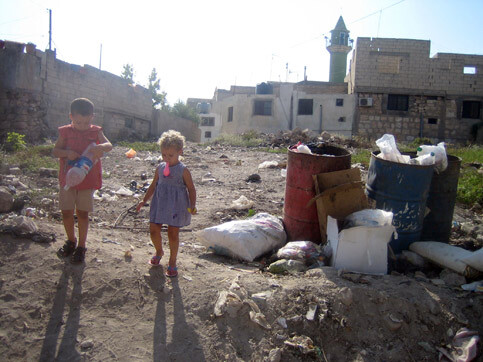IRIN 28 August 2006

Children in Tyre suffer trauma from the ordeal of living through war. (Serene Assir/IRIN)
TYRE - The United Nations children’s fund (UNICEF), together with other NGOs, is setting up children’s activity centres in Nabatiyeh, 80km south of the capital, and in the port city of Tyre, 90km south of Beirut,to recreate a semblance of normalcy for children in Lebanon. Teams of travelling entertainers will be sent out to villages around the towns to organise similar activities.
More than a third of the Lebanese killed in the 34-day conflict with Israel were children, according to UNICEF. “The degree to which children have been affected varies from one child to another,” said Ola Attia, a Beirut-based clinical psychiatrist, who does voluntary work with local NGO Samidoun in the south. “The closer they have experienced the shock and the more destruction they have witnessed, the stronger the reaction tends to be.”
Among the common reactions she and others working with children have observed are disturbed sleeping patterns and loss of appetite.
“These are natural reactions to an unnatural situation,” said Attia. “We are asking parents to restore a sense of confidence in their children, so that such reactions begin to subside naturally.”
“The aim [of the project] is to provide children with a means to break from what they’ve been through,” said Simon Ingram, UNICEF spokesman in Beirut, adding that this project aimed to reach 45,000 children.
By holding such activities, it becomes easier to identify those children who have suffered genuine trauma, Ingram said. “The period between now and the resumption of school is crucial to enable children to recapture something they can remember from their pre-war childhood.”
Israel launched its military offensive in response to the capture of two of its soldiers by Hezbollah on 12 July. A United Nations-brokered ceasefire brought the conflict to an end on 14 August, after 1,183 Lebanese and 158 Israelis had been killed, according to their respective governments.
Fear in the south
Sitting on the balcony of her family home on the outskirts of Tyre, 12-year-old Aliki recounts the Israeli bombardments. “I was very frightened,” she said. “I remember the planes flying above our house all day and all night.”
South Lebanon, from where Hezbollah fired rockets into northern Israel, bore the brunt of Israel’s attacks.
“Children coming from Marwahin [a southern village near the Israeli border] have been among the most traumatised by the war,” said Attia. On 15 July, Israeli planes bombed a civilian convoy fleeing Marwahin and killed 18 people. About half of the passengers were said to be minors. Israel said its target was terrorists and that its military had no intention of killing civilians.
Some children appear less affected by the bombings. “I was not scared,” said Emilia, 8. “Well, only a little.”
Her mother, who preferred not to be named, said that in the first 12 days of the war, which the family spent in their home in Tyre, she tried as hard as she could to retain a semblance of confidence so as to not create further distress for her children. “The children were very good,” she said. “Most days, they did not panic.”
However, having fled to Beirut in the middle of the conflict and returned home after the ceasefire, Emilia knows there are still planes in the sky. “She cannot sleep some nights,” her mother said. “And most of the time, she won’t go to the bathroom alone. She will ask me to go with her.”
Attia says despite these symptoms, children are highly resilient. “Children may have emerged with terrible shock, but they can also overcome this shock with great ease if early intervention takes place,” she said. “In most cases, all we have to do is trigger children’s inherent ability to cope rather than take any direct steps.”
This item comes to you via IRIN, a UN humanitarian news and information service, but may not necessarily reflect the views of the United Nations or its agencies. All IRIN material may be reposted or reprinted free-of-charge; refer to the copyright page for conditions of use. IRIN is a project of the UN Office for the Coordination of Humanitarian Affairs.
Related Links